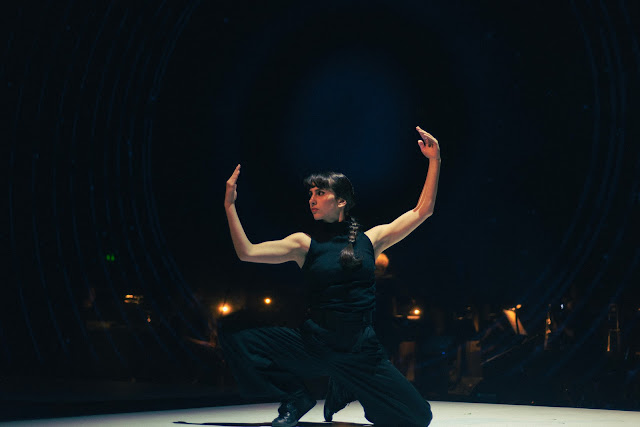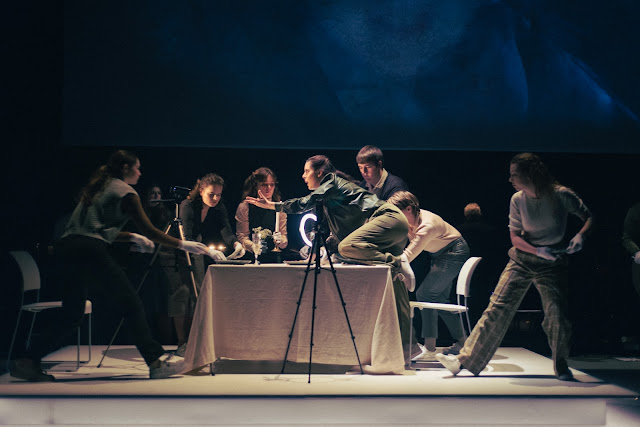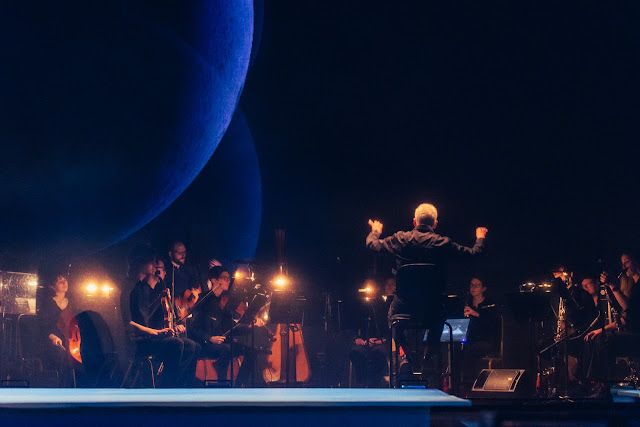 |
| Edward Jessen: Syllable - Claudia Hilda Rodriguez Pozo - Trinity Laban Opera (Photo John Hunter at RULER) |
Edward Jessen Syllable; Conductor Gregory Rose, director Joseph Alford; Trinity Laban Opera at Laban Theatre
Reviewed by Robert Hugill on 15 January 2022
Trinity Laban Opera in a brand new piece of experimental music theatre created by composer Edward Jessen from the conservatoire's music staff
Rather impressively, Edward Jessen's new music theatre piece, Syllable, is an ambitious and experimental work created in-house by Trinity Laban Opera. The work debuted on Friday 14 January 2022 and we caught the second cast, performing on Saturday 15 January 2022 at the Laban Theatre in Deptford. Composed by Edward Jessen and directed by Joseph Alford, the performance featured Claudia Hilda Rodriguez Pozo, Juliet Wallace, Miranda Ostler, Amy Kearsley, Imogen Burgess, Sholto Biscoe-Taylor and Niall Windass, with a vocal and instrumental ensemble conducted by Gregory Rose. Designs were by Molly Einchcomb, projection design by Akhila Krishnan, sound design by David Sheppard and Ian Dearden of Sound Intermedia, lighting design Malcolm Rippeth. The production also featured a recorded spoken narration created by Bastard Assignments.
 |
| Edward Jessen: Syllable - Trinity Laban Opera (Photo John Hunter at RULER) |
Billed as an operatic sonic work, Jessen's piece was much more a work of experimental music theatre than a conventional opera as it pushed a number of boundaries of conventional operatic story telling. As such it was much more the sort of work one might come across in a low-budget production at Tête à Tête: The Opera Festival rather than in the handsome Laban Theatre at Trinity Laban, and given in an impressively thought-through and technically complex production.
The inspiration for the work was a tale from Primo Levi’s 1975 collection of short stories The Periodic Table, though Jessen's programme note implied that there was another tale, inspired by Ovid, worked in too. Though there were characters, and there was singing, what the characters' sang seemed less important (and I never did discern any of the sung text) than what they were doing. Often, a single character would sing whilst action was enacted by the others.
Alford's production was technically complex and highly ingenious, making striking use of projection in a number of innovative ways including one scene where a character seemed to be having a dinner with herself. On a technical level this evening was superb, both in the imagination applied to the staging and the way it was very successfully implemented.
The dominating text was the spoken narration, pre-recorded by the members of Bastard Assignments (Timothy Cape, Edward Henderson, Caitlin Rowley, Josh Spear ). This was free-form and improvisatory in style, and though I am unfamiliar with the Primo Levi story, the text seemed to take themes from it rather than give a sequential narration. But this was reflective of the reflexive approach to narration in the whole piece. My only regret with the narration was that it was pre-recorded, and I did rather wish that there had been cast present in the room to speak it.
There was a character, Primo, played by dancer and actress Claudia Hilda Rodriguez Pozo who sometimes contributed strong solo dance moments, strikingly choreographed, to accompany both Jensen's music and Bastard Assignments' narration. These were interleaved with staged scenes, though sometimes Rodriguez Pozo interacted with the singers too.
The staging seemed to be interested in the idea of dissolution, two or three scenes were staged and re-staged in different ways, yet each time gradually losing something so that eventually we were left simply with a dim outline. How much of this was predicated on Jessen's score, and how much as invention of Alford, I have no idea. Though the performance had an element of the 'devised' about it, there was nothing improvisatory, all was carefully crafted and stunningly enacted by the performers who acted as soloists, ensembles and stage hands (there was a lot of stage business and stage movement, all impressively coordinated).
 |
| Edward Jessen: Syllable - Gregory Rose & orchestra - Trinity Laban Opera (Photo John Hunter at RULER) |
Behind a scrim was Gregory Rose and the orchestra (single strings and woodwind, horn, trombone, percussion, harp and keyboard) and the music was near continuous. Striking and effective, the score formed a dramatic counterpart to the stage action, the orchestra sometimes accompanying but just as often contributing dramatic gestures of their own.
I found the result surprisingly absorbing. The sound world was as intriguing as the visual, and I had no qualms about the way Jessen's music contributed to the whole. Confidently performed by the students, there was no sense of something new and uncertain, there was an élan to both the staging and the musical performance. But I have to confess that I have no idea what was going on, in a sense I sat there and enjoyed a sense of ritual being performed before me.
Never miss out on future posts by following us
The blog is free, but I'd be delighted if you were to show your appreciation by buying me a coffee.
Elsewhere on this blog
- Still in cracking form: Verdi's Nabucco returns to Covent Garden - opera review
- The sense of eternity that can be found in the simple doing of something: Sven Helbig's Skills - interview
- In stunning control of his material: Gavin Higgins' Ekstasis from Piatti Quartet, Fidelio Trio, Thomas Gould, David Cohen, Sara Roberts - record review
- Personal Stories: Cevanne Horrocks-Hopayian's Welcome Party on NMIC - record review
- Panache, intensity and vivid story-telling from Claire Booth and Christopher Glynn in Modest Musorgsky: Unorthodox music at Wigmore Hall - concert review
- A joy in complexity of texture and rhythm: Sinfonietta Riga in four recent works written for them by Lativan composers - record review
- We live in a world where nothing has been left untouched by humanity: composer Jan-Peter de Graaff chats about the inspirations for his new cello concerto - interview
- Colour and movement: Patrick Allies and Siglo de Oro transport us to 17th century New Spain - concert review
- Full of the joy of Christmas: music by Heinrich Schütz and his contemporaries from Arcangelo at Wigmore Hall - concert review
- Hymns to the Virgin: the Tallis Scholars at St John's Smith Square's Christmas Festival - concert review
- The Other Erlking: Songs and Ballads of Carl Loewe, from Nicholas Mogg and Jâms Coleman - record review
- Focused intensity and sheer joyful elan: John Butt and Dunedin Consort perform Handel's Messiah at Wigmore Hall - concert review
- Home







%20as%20Leporello%20and%20Erik%20Tofte%20(back%20to%20camera%20in%20garnet%20shirt)%20as%20Giovanni%20-%20Don%20Giovanni.jpg)



No comments:
Post a Comment